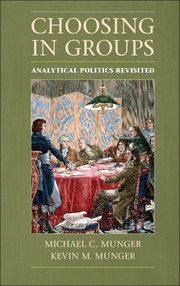Book contents
- Frontmatter
- Dedication
- Epigraph
- Contents
- List of Figures
- List of Tables
- Preface
- I Basics
- 1 The Analysis of Politics
- 2 Becoming a Group: The Constitution
- 3 Choosing in Groups: An Intuitive Presentation
- 4 The Analytics of Choosing in Groups
- II Spatial Theory
- III Extensions
- Answers to Selected Exercises
- Notes
- References
- Index
1 - The Analysis of Politics
Published online by Cambridge University Press: 05 February 2015
- Frontmatter
- Dedication
- Epigraph
- Contents
- List of Figures
- List of Tables
- Preface
- I Basics
- 1 The Analysis of Politics
- 2 Becoming a Group: The Constitution
- 3 Choosing in Groups: An Intuitive Presentation
- 4 The Analytics of Choosing in Groups
- II Spatial Theory
- III Extensions
- Answers to Selected Exercises
- Notes
- References
- Index
Summary
That argument … maintained by many who assume to be authorities, was … that the opinions of some men are to be regarded, and of other men not to be regarded. Now you, Crito, are a disinterested person who are not going to die tomorrow.… Tell me, then, whether I am right in saying that some opinions, and the opinions of some men only, are to be valued, and other opinions, and the opinions of other men, are not to be valued. I ask you whether I was right in maintaining this?
(Socrates, in Plato’s Crito)Choosing in Groups: Politics as Constituted Cooperative Action
Ambrose Bierce claimed, in The Devil’s Dictionary, that politics is the “strife of interests masquerading as a contest of principles … the conduct of public affairs for private advantage.” At its crudest, politics may seem like nothing more than the use of power and authority to direct social relations. Franz de Waal, in Chimpanzee Politics, defined politics as “social manipulation to secure and maintain influential positions,” and then pointed out that “politics involves every one of us … in our family, at school, at work, and in meetings” (p. 208).
But there must be something more to politics, more merit to the idea that groups can choose well, as a group and for the group. Not as a state, or government, necessarily, but as a socially constituted group, because “politics” is really just choosing and acting in groups. It is a mistake to think that choosing in groups is zero sum, so that for every winner there is a loser. Long ago, the Greek philosopher Aristotle (Book III, part 9) claimed that we should understand politics not (only) as a means of choosing, but as a path to social connectedness. Politics is the set of social relations by which societies become good and people achieve fulfillment.
- Type
- Chapter
- Information
- Choosing in GroupsAnalytical Politics Revisited, pp. 3 - 25Publisher: Cambridge University PressPrint publication year: 2015



